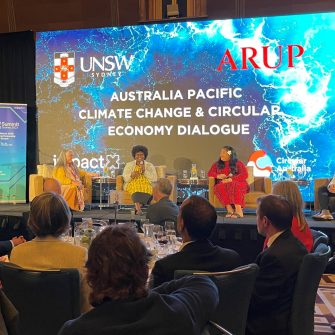Developing a Roadmap for Collaborative Action
Australia Pacific Climate & Circular Economy Dialogue

Climate change is exerting significant impacts on society, for present and future generations, and importantly, on Australia's regional neighbours. The worst impacts of climate change, such as sea-level rise, intensified tropical cyclones, heat extremes, flooding rains and drought, all impact the South Pacific region.
More than 300 leaders from industry, government, academia and community groups convened at the second Australia Circular Economy Dialogue in Sydney on 26 June.
Hosted by UNSW Sydney, the International Universities Climate Alliance (IUCA), Circular Australia and Impact X, participants at the forum proposed recommendations outlining the priorities, barriers, opportunities and key reforms needed to create a national ‘circular economy’ in Australia by 2030. The Australia Pacific Climate & Circular Economy Dialogue was held at the conclusion of the Forum.
While working together to solve this problem, in addition to raising the alarm, it’s critical pathways forward are explored. This is a problem that transcends national borders, and requires solutions and resilience to mitigate, and adapt to, climate change.
Nations such as Australia need to lead in this via technology transfer, investment in infrastructure and regional solutions, and UNSW Sydney stands ready to tackle the challenges of climate change and sustainable development in our wider region.
The Dialogue highlighted the interconnection between climate change and circular economy and how eliminating waste, circulating materials and regenerating nature will be critical to achieving emissions reduction targets in the region.
Ralk Regenvanu, Vanuatu’s Minister of Climate Change Adaptation, Meteorology and Geo-Hazards, Energy, Environment and National Disaster Management, drew attention to the fact that Vanuatu’s land area is roughly one-third the size of greater Sydney. In a country this size, ‘we cannot afford landfill’, he stressed. Until the mid-1980s, Minister Regenvanu noted, Vanuatu’s economy was circular. Today however, the country imports – from Australia – virtually all of its fossil fuels and non-biodegradable waste.
While Pasifika policymakers are adopting new measures to improve waste management, such as the recent introduction of a waste separation system in Port Vila, one of the first such systems in the Pacific, Minister Regenvanu stressed the role that Australia must play in supporting the re-establishment of circular economies in the Pacific. This includes the need for the development and implementation of producer agreements in Australia requiring producers to cover costs of their own packaging and waste.
The Dialogue also highlighted how the climate crisis acts as a ‘threat multiplier’, exacerbating existing vulnerabilities and inequalities. Lydia Tabuya, Fiji’s Minister for Women, Children and Poverty Alleviation stressed that ‘women and girls bear the brunt of these challenges’. However, she noted that women and girls are frequently excluded from decision-making fora where policies and initiatives are crafted and implemented.
Together with Circular Australia, Impact X, the IUCA, UNSW Sydney is curating a series of high-level interactions to shape an essential policy narrative on climate adaptation accompanying circular economy. This collaboration will support and shape the Australian-Pacific joint bid to host the COP31 on climate in 2026 and the Australian bid to host the Global Circular Economy Forum in 2025.
“Achieving the 2030 national circular economy target demands a multidisciplinary, systems approach and active partnership across research, academia, industry, government, NGOs and the community”.
“UNSW is privileged to have deep credentials in highly relevant disciplines including circular economies, climate science, renewable energy, sustainable industrial practices and development, as well as an abiding commitment to building a more sustainable future through collaborative research and innovation.”
Professor Attila Brungs, Vice-Chancellor and President of UNSW
(L-R):
Moderator: Susan Moylan-Coombs, Founding Director, Gaimaragal Group
Gwen Sissiou, General Manager, Climate Change & Development Authority, Papua New Guinea
Marina Keil, President, Samoa Recycling & Waste Management Association
Kushaal Raj, Director, Climate Change Division, Office of the Prime Minister, Fiji
